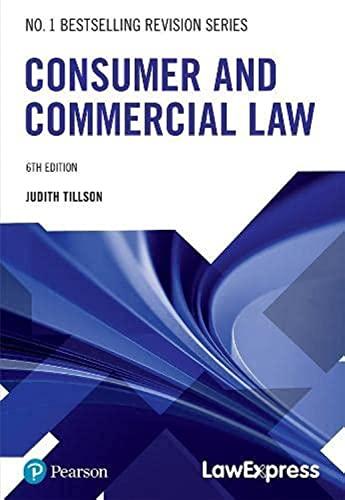Question
Five class actions on behalf of New York consumers were filed against defendant tobacco companies and two other entities, the Council for Tobacco Research and
Five class actions on behalf of New York consumers were filed against defendant tobacco companies and two other entities, the Council for Tobacco Research and the Tobacco Institute. In each of the suits, plaintiffs sought to represent a class of New York residents who, on or after June 19, 1980,became or continued to be nicotine dependent as a result of buying and smoking cigarettes in New York that were manufactured by defendants. Plaintiffs allege that defendants used deceptive commercial practices to sell their cigarettes to New Yorkers and that they would not have bought these cigarettes had they known that nicotine is an addictive drug; that the tobacco companies controlled the level of nicotine in their cigarettes to cause or maintain nicotine addiction; and, that the companies secretly used chemicals to enhance the addictive propensities of nicotine. Plaintiffs also assert that the companies suppressed research indicating that nicotine is addictive. They seek only the reimbursement of the purchase cost of cigarettes that they claim they would not have bought, but for defendants' fraudulent and deceptive practices. In each case, plaintiffs' lawyers moved to certify the class of addicted smokers alleged in the various complaints. In considering the requirements for class certification pursuant to CPLR 901 (a), the trial court determined that "a claim which turns on proof of actual addiction would involve far too manysubjective factors" (Small v Lorillard Tobacco Co.,175 Misc 2d 294, 300). The court concluded that issues regarding addiction are not part of the claims presented because "the central issue is whether plaintiffs and the class members can recoup the money they spent in a transaction that was purportedly riddled with fraudulent activities" (id.,at 301). The courtsua sponteeliminated the need to prove an individual's nicotine addiction; redefined the proposed class definition to include plaintiffs and potential class members who purchased defendants' cigarettes while the defendants were allegedly engaging in a pattern of fraudulent activities; and, as redefined, certified the classes. Plaintiffs have accepted the court-modified class definition for purposes of the litigation and their appeal to this Court. In a separate order, the trial court also determined that plaintiffs pleaded fraud with sufficient particularity and that their claims were not preempted by the Federal Labeling Act (Small v Lorillard Tobacco Co.,176 Misc 2d 413). The court also denied without prejudice defendant B.A.T.'s motion to dismiss for lack of personal jurisdiction. The Appellate Division reversed both orders on a composite appeal of the entire matter (Small v Lorillard Tobacco Co.,252 AD2d 1). After analyzing the requirements of CPLR 901 (a), the Court held that class certification was not justified under the statutory criteria. It also determined that plaintiffs' claims were preempted by the Federal statute, insofar as they allege fraudulent concealment and failure to warn of the dangers of nicotine. While it concluded that plaintiffs' claims alleging affirmative misrepresentation were not preempted by the Federal statute, the Court nonetheless dismissed those claims because they were not pleaded with the required specificity.
1.Echocardiography is essentially ________
2.Echocardiography can be used for even _________
3.Business intelligence (BI) is a broad category of application programs that includes
4.Business intelligence equips enterprises to gain business advantage from data
5.BI is a category of database software that provides an interface to help users quickly and interactively scrutinize the results in a variety of dimensions of the data
6._________ is a category of applications and technologies for presenting and analyzing corporate and external data.
7.________ is a performance management tool that recapitulates an organization's performance from several standpoints on a single page.
8.BI can catalyze a business's success in terms of?
9.If a nurse finds that a patient's abdominal wound has eviscerated, she should?
10.A patient with a history of heart disease can be put on a prophylactic antibiotic.
Step by Step Solution
There are 3 Steps involved in it
Step: 1

Get Instant Access to Expert-Tailored Solutions
See step-by-step solutions with expert insights and AI powered tools for academic success
Step: 2

Step: 3

Ace Your Homework with AI
Get the answers you need in no time with our AI-driven, step-by-step assistance
Get Started


